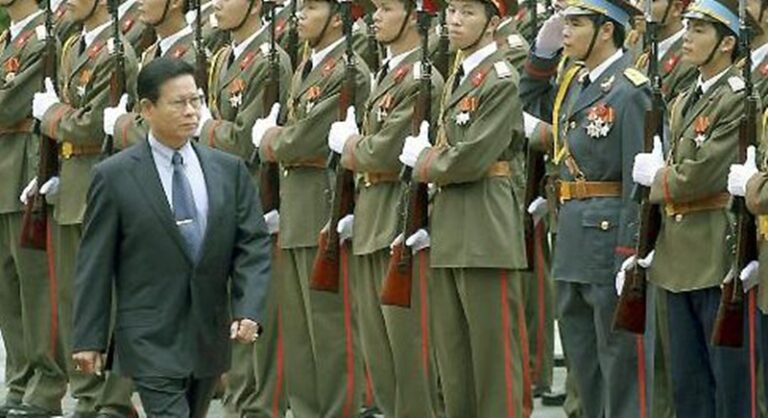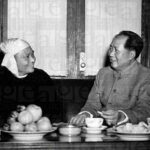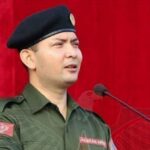
General Khin Nyunt – Former Prime Minister of Myanmar
Early Life and Military Career
General Khin Nyunt was born on October 23, 1939, in Kyauktan Township, near Yangon. He came from a Hakka Chinese family and joined the Myanmar Army in 1959, graduating from the Officers Training School the following year.
During his early service, he took on various battalion assignments and quickly proved himself a capable officer. By the 1980s, Khin Nyunt had earned the trust of General Ne Win, Myanmar’s strongman at the time. Serving as Ne Win’s personal aide, he gained access to the inner workings of the regime and began building his influence within the military.
His disciplined work ethic and loyalty helped him advance rapidly. As his responsibilities grew, so did his understanding of Myanmar’s internal politics and power dynamics.
Rise to Power
In 1984, Khin Nyunt became the head of the Directorate of Defense Services Intelligence (DDSI) — Myanmar’s military intelligence agency. Under his leadership, the DDSI evolved into one of the country’s most powerful institutions.
He expanded the agency’s reach by developing a vast network of informants and surveillance operations across Myanmar. These measures allowed the military to monitor opposition movements and suppress dissent effectively. As a result, Khin Nyunt gained a reputation as both a brilliant strategist and a feared enforcer.
His growing power made him one of the most influential figures in the military government. By the late 1990s, he was seen as a key architect of the junta’s control over the nation.
Prime Ministership and Reforms
In August 2003, Khin Nyunt was appointed Prime Minister of Myanmar by the ruling State Peace and Development Council (SPDC). His promotion appeared to mark a shift in the junta’s strategy, as he began introducing cautious reforms.
He attempted to modernize the country by promoting foreign investment and tourism, and by engaging in limited dialogue with opposition and ethnic armed groups. Notably, he negotiated ceasefire agreements with several ethnic organizations, aiming to reduce internal conflict and stabilize Myanmar’s border regions.
Although some observers viewed these efforts as genuine reform, others believed they were designed to strengthen military control while projecting a softer image abroad. Even so, his initiatives signaled an unusual openness in a regime known for its isolation.
Internal Tensions and Downfall
Khin Nyunt’s rise also created tension within the military hierarchy. His expanding influence, combined with his intelligence network’s power, alarmed other generals.
On October 18, 2004, the government abruptly announced his removal as Prime Minister, citing health reasons. However, most analysts viewed his dismissal as the result of a power struggle between reformist and hardline factions within the junta.
Soon after, Khin Nyunt was arrested and charged with corruption. In 2005, he received a 44-year prison sentence, though it was largely served under house arrest. His removal ended a brief period of cautious reform and ushered in renewed military isolation.
Life After Release
After nearly seven years of confinement, Khin Nyunt was released in January 2012 during a wave of political amnesties. Following his release, he kept a low public profile, avoiding direct involvement in politics.
He opened a coffee shop and art gallery in Yangon, spending his time promoting local artists and engaging in small business ventures. In interviews, Khin Nyunt expressed regret for some of the harsh measures carried out under his command. He claimed he had tried to act as a mediator between the military and the opposition, including Aung San Suu Kyi, during his years in power.
His quieter lifestyle after 2012 marked a stark contrast to his former position as one of Myanmar’s most feared men.
Legacy and Historical Impact
Khin Nyunt’s legacy remains deeply controversial. Supporters credit him for introducing limited reforms and initiating peace efforts with ethnic groups. Critics, however, remember his tenure as head of military intelligence for its human rights abuses, including arbitrary arrests and torture of political prisoners.
His downfall reshaped Myanmar’s power structure. After his removal, the intelligence apparatus he built was dismantled, leading to a period of instability within the military government. Many analysts believe his exit delayed Myanmar’s political opening by several years.
Despite his mixed record, General Khin Nyunt remains one of the most significant figures in Myanmar’s modern history — a man who embodied both reformist ambitions and authoritarian control.
Further Reading
For a detailed account of his political career, see Andrew Selth’s book “Secrets and Power in Myanmar: Intelligence and the Fall of General Khin Nyunt”, which provides an in-depth analysis of his rise, influence, and downfall.
FAQ: General Khin Nyunt
Who is General Khin Nyunt?
General Khin Nyunt is a former Prime Minister of Myanmar and the country’s former Military Intelligence Chief. He was one of the most powerful figures in Myanmar’s military government during the 1980s and 1990s, playing a central role in state security, intelligence operations, and political affairs until his fall from power in 2004.
When and where was Khin Nyunt born?
Khin Nyunt was born on October 23, 1939, in Kyauktan Township, near Yangon, Myanmar. He came from a Hakka Chinese family, a minority group with deep roots in Myanmar’s business and military circles.
What was Khin Nyunt’s early military background?
He joined the Myanmar Army in 1959 and graduated from the Officers Training School in 1960. His early service included various battalion postings, where he developed a reputation for discipline and loyalty. During the 1980s, he became a close aide to General Ne Win, the then-leader of Myanmar, gaining influence within the military elite.
How did Khin Nyunt rise to power?
In 1984, he was appointed head of the Directorate of Defense Services Intelligence (DDSI). Under his leadership, the DDSI expanded its power across the country through surveillance, informant networks, and political control. His growing influence eventually led to his appointment as Prime Minister in 2003, marking the peak of his political career.
What were his major policies as Prime Minister?
As Prime Minister, Khin Nyunt attempted modest reforms. He sought to modernize Myanmar’s economy, attract foreign investment, and open limited dialogue with ethnic armed groups. He was also known for negotiating ceasefire agreements that temporarily reduced conflict in several regions. However, many critics argued that his reforms were limited and primarily aimed at strengthening the military regime.
Why did Khin Nyunt fall from power?
On October 18, 2004, Khin Nyunt was removed from office and later arrested. The government claimed health reasons for his retirement, but insiders reported a power struggle between him and hardline generals who feared his growing influence. He was charged with corruption and abuse of power, eventually receiving a 44-year prison sentence, which he served mostly under house arrest.
How long was Khin Nyunt under house arrest?
Khin Nyunt spent nearly seven years under house arrest before his release in January 2012. His detention reflected the junta’s internal divisions and its broader crackdown on perceived reformists within its ranks.
What did Khin Nyunt do after his release?
After his release, Khin Nyunt led a quiet civilian life in Yangon. He opened a coffee shop and art gallery, supporting young artists and focusing on business ventures. In interviews, he expressed regret for some of the repressive actions taken under his rule and claimed he had tried to mediate between the military and Aung San Suu Kyi.
What is Khin Nyunt’s legacy?
Khin Nyunt’s legacy is complex and controversial. Supporters remember him as a pragmatic reformer who sought to balance Myanmar’s isolation with limited openness. Critics, however, highlight his leadership of a powerful intelligence network responsible for human rights abuses and political repression. His fall marked the decline of Myanmar’s once-dominant intelligence apparatus.
What is the significance of Khin Nyunt’s role in Myanmar’s history?
Khin Nyunt symbolizes a pivotal era in Myanmar’s modern history — one defined by intelligence dominance, internal conflict, and cautious reform. His story reflects the tension between modernization and authoritarian control, making him a key figure in understanding Myanmar’s political evolution.
Has Khin Nyunt been involved in politics since his release?
No. Since his release in 2012, Khin Nyunt has remained politically inactive. He has avoided public controversies and rarely comments on current political developments. His focus has shifted to personal business and family life.
Where can I learn more about General Khin Nyunt?
For an in-depth look into his career and the intelligence system he built, refer to Andrew Selth’s book:
“Secrets and Power in Myanmar: Intelligence and the Fall of General Khin Nyunt.”
It provides a detailed analysis of his rise, influence, and eventual downfall.





